Mixing substances, whether it’s medication or illicit drugs, with alcohol can be dangerous. Sometimes, individuals are unaware of the specific consequences, but the warning against it is widely spread. People often choose to avoid alcohol or drug combinations to stay safe, while others intentionally mix substances to achieve desired effects. It’s important to understand the risks and side effects of combining substances and to follow medical advice. For example, Ambien and alcohol is a dangerous medication mixture.
Northpoint Washington offers drug and alcohol addiction treatment programs for those who live with substance abuse. Call 888.450.2153 now to get started.
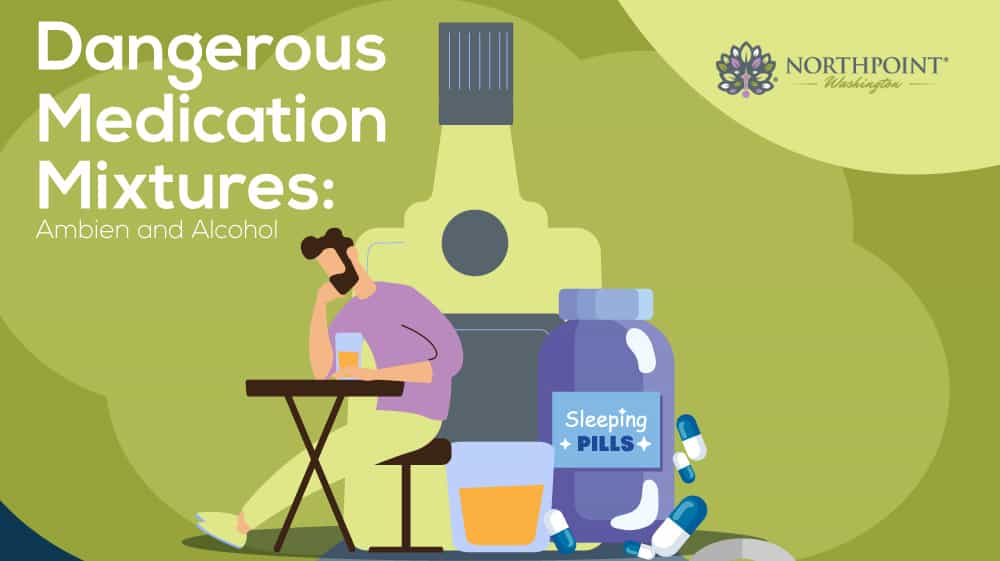
What Is Ambien?
Ambien is a well-known brand for the drug zolpidem, which is used to treat insomnia. Insomnia is a condition where individuals struggle to fall or stay asleep, leading to daytime fatigue and irritability. It can be acute or chronic, lasting for a short or longer period of time.
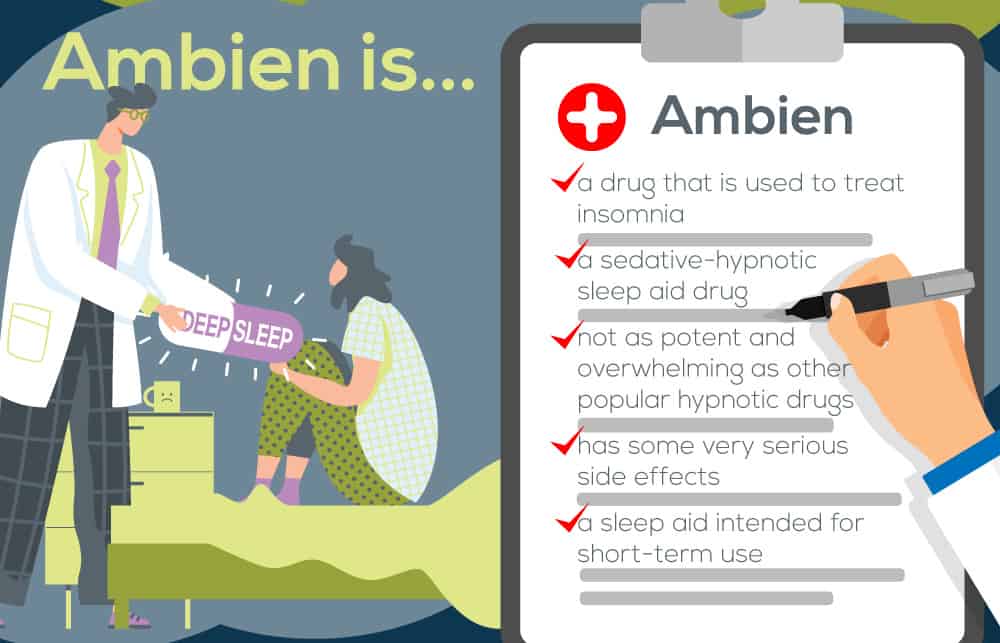
The medication is a sedative-hypnotic sleep aid. It belongs to a class of drugs known as hypnotics, which help people with insomnia or sleep disorders get quality sleep. The word “hypnotic” comes from the Greek word “hypnos,” meaning sleep. Ambien was developed as a milder alternative to other powerful hypnotic drugs like Valium or Nembutal.
Benzos and barbiturates helped with sleep but had strong side effects, like over-sedation and daytime drowsiness. Ambien emerged as an alternative in the 90s, effectively aiding insomnia without the same drawbacks. It gained popularity and is still commonly prescribed today.
However, many who sought to avoid side effects with Ambien soon discovered its own potential for serious side effects. Ambien is intended for short-term use as a sleep aid. As its prescription increased, the serious side effects were studied more closely. The findings revealed that longer-term or recreational use of Ambien could lead to more severe side effects. Mixing Ambien with alcohol is a dangerous medication mixture that brings on even more risks.
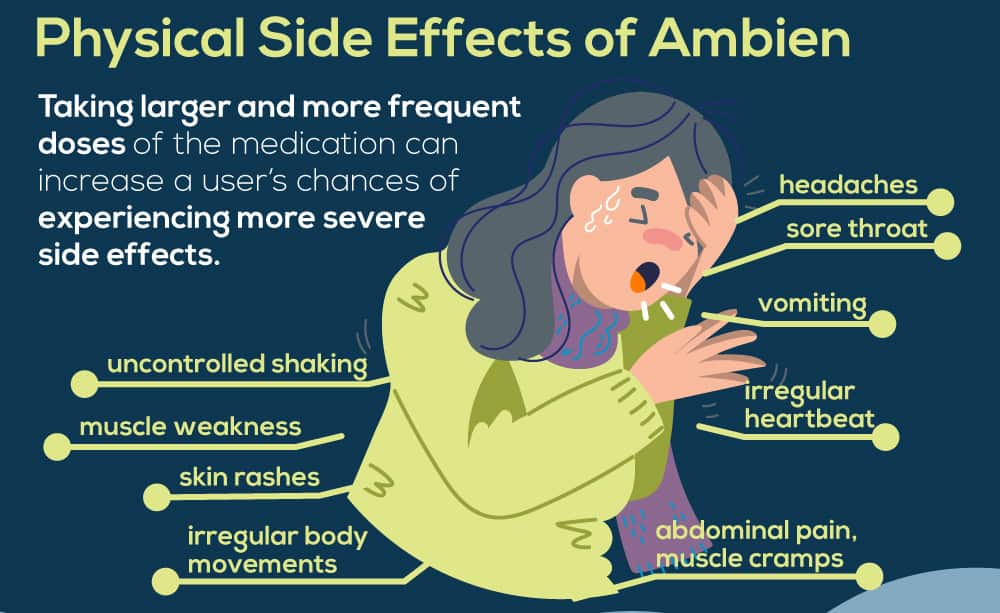
Physical Side Effects of Ambien
Misusing a substance by taking it when it’s unneeded or taking larger and more frequent doses of the medication can increase an individual’s chances of experiencing more severe side effects.
Physical side effects of Ambien can include:
- Very fast or irregular heartbeat
- Nausea
- Vomiting
- Diarrhea
- Lightheadedness
- Headaches
- Sore throat
- Abdominal pain
- Seeing double
- Muscle cramps
- Muscle weakness
- Skin rashes
- Irregular body movements
- Uncontrolled shaking
- Drowsiness
- Pinpoint pupils (pupils that have constricted to a small size)
- Slow and ineffective breathing (respiratory depression)
Experiencing an allergic reaction to Ambien is also a possibility for some individuals. Telltale signs of an allergic reaction include swelling of the face, mouth, and tongue, breaking out in hives, and shortness of breath. An allergic reaction requires immediate emergency medical attention.
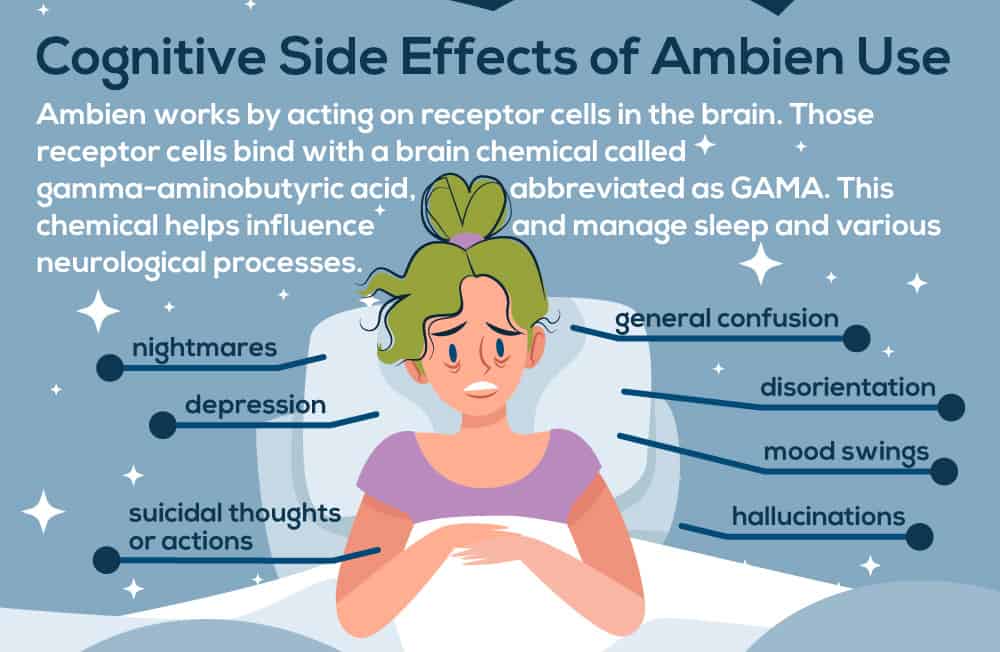
Cognitive Side Effects of Ambien
Ambien works by acting on receptor cells in the brain. Those receptor cells bind with a brain chemical called gamma-aminobutyric acid, abbreviated as GAMA. This chemical helps influence and manage sleep and various neurological processes. Because of the drug’s interactions with this chemical in the brain, upon taking Ambien, it is possible that some users may experience various cognitive side effects.
These cognitive side effects of Ambien can include:
- Trouble concentrating
- Memory loss (amnesia)
- Disorientation, especially about place or time
- General confusion
- Loss of appreciation or pleasure in life
- Depression
- Suicidal thoughts or actions
- Anxiety
- Mood swings
- Nightmares
- Hallucinations
- Disturbances in sleep
- Inability to get a restful night’s sleep
The cognitive side effects of Ambien are concerning, as these effects can impact daily life and overall well-being. The combination of Ambien with alcohol can further intensify these side effects and increase the risk of dangerous behavior or accidents.
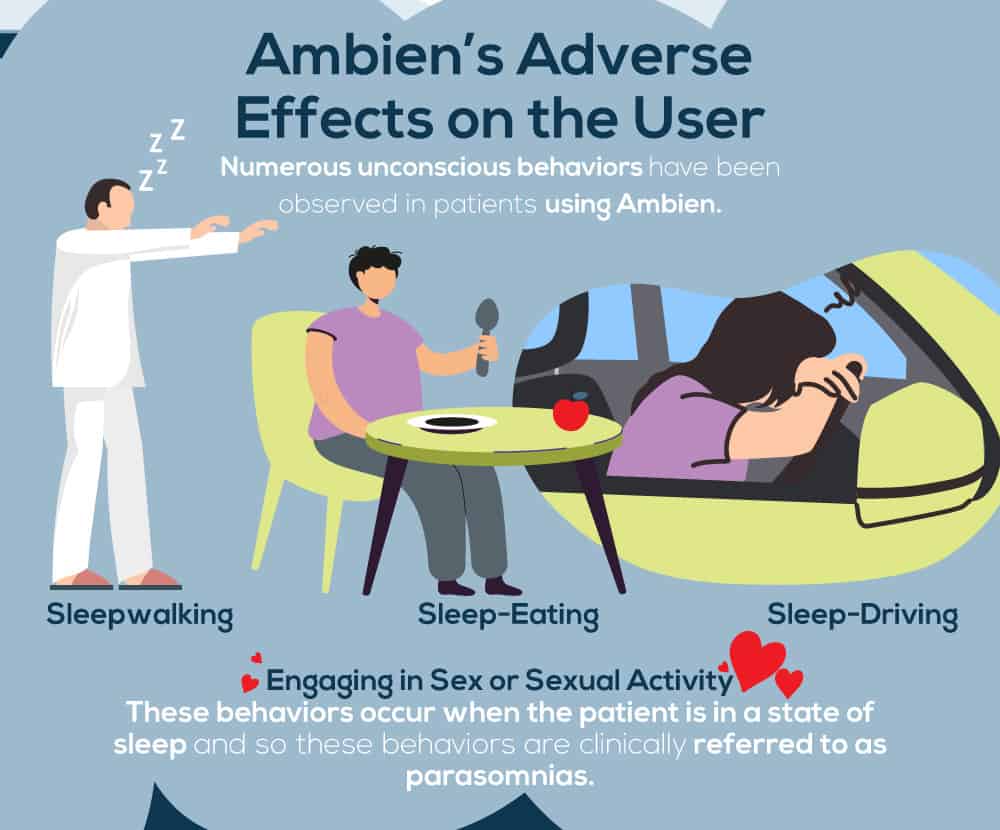
Ambien’s Adverse Effects on Sleep
Although many people can and do benefit from short-term Ambien use, long-term use of Ambien, and even some normal use of it, can have some very serious side effects. For example, numerous unconscious behaviors have been observed in patients using Ambien. These behaviors occur when the patient is in a state of sleep, and so these behaviors are clinically referred to as parasomnias. These parasomnias can include
- Sleepwalking
- Sleep-eating
- Sleep-driving
- Engaging in sex or sexual activity
The trouble with Ambien and alcohol often revolves around the issue of exacerbating parasomnias and other side effects of Ambien.
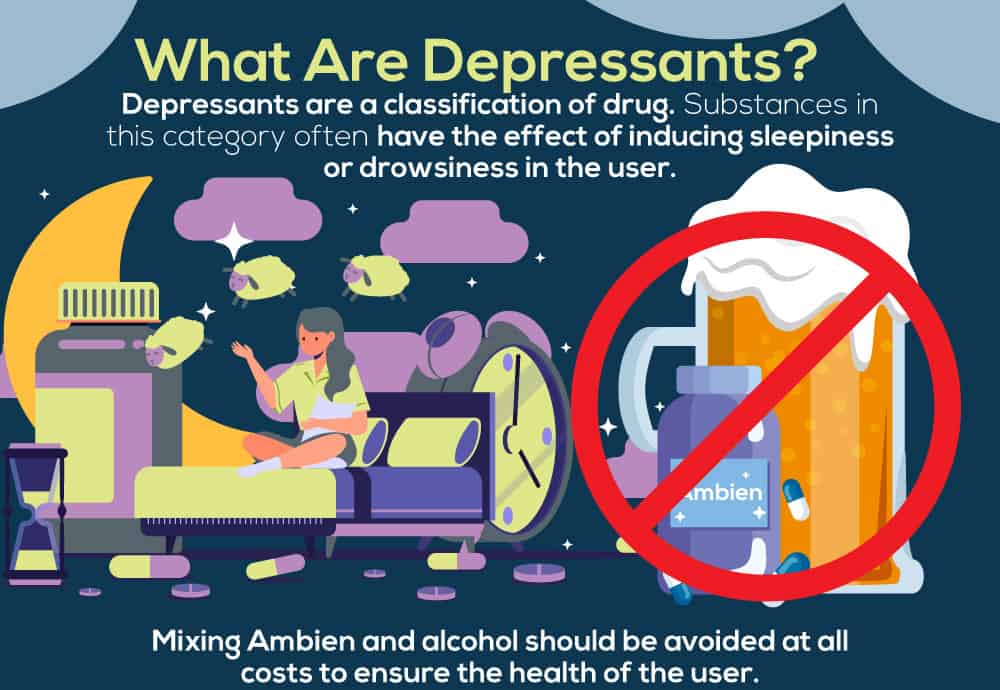
What Are Depressants?
Mixing Ambien and alcohol should be avoided at all costs to ensure the health of the individual. In fact, Ambien should not be taken with any kind of depressant at all. Depressants are a classification of drugs. Substances in this category often have the effect of inducing sleepiness or drowsiness in the user. These substances are known to relieve anxiety and tension and induce sleep.
Substances that depress the central nervous system include alcohol, opioids, and tranquilizers. In combination with Ambien, its sedative effects will be amplified. This can increase the risk of fatal overdose and injury from accidents. Besides exacerbating the risk of overdose and accidental injuries, parasomnias, especially, can be affected by the consumption of alcohol and Ambien. When Ambien is combined with alcohol, the risk of experiencing parasomnia is increased.
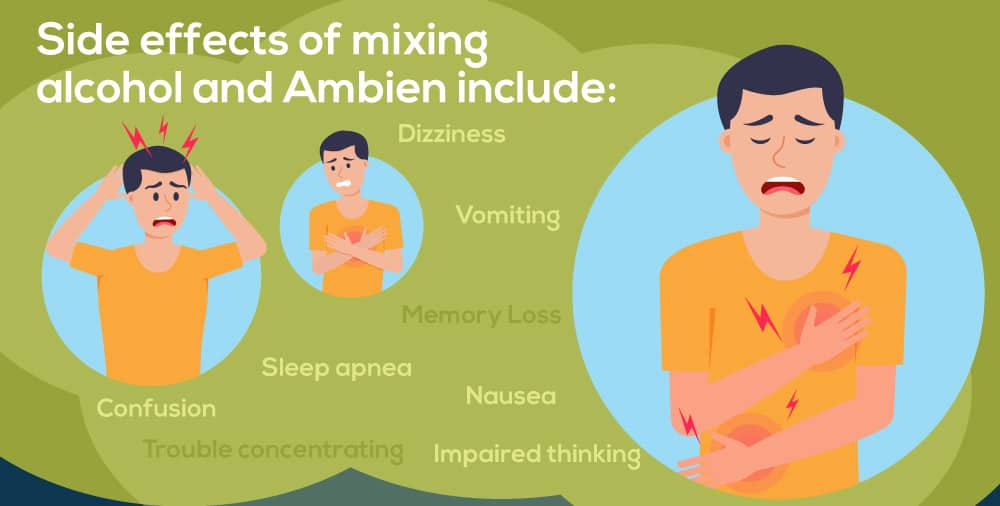
Dangers of Mixing Ambien and Alcohol
Although it may not seem like a big deal, there are many downsides to increasing the risk of parasomnias. For example, when it comes to sleep-driving, the mental alertness and coordination needed to drive are not as present, posing a great risk to the safety of the driver as well as other motorists. With sleep-eating, individuals who need to stick to a required diet for the sake of their health can be blindsided by the sleep-eating habits they undertake when they are completely unaware. In addition, sleep-eating poses a danger to the individual, who may attempt to operate kitchen equipment in a sleep state and may injure themselves by accident.
Side effects of mixing alcohol and Ambien include:
- Dizziness
- Trouble concentrating
- Coordination problems
- Impaired thinking and judgment
- Sleep apnea
- Decreased or troubled breathing
- Confusion
- Slowed heart rate
- Memory loss (amnesia)
- Drowsiness
- Sleepwalking (and other parasomnias)
- Hallucinations or delusions
- Vomiting
- Nausea
- Fainting
- Collapse
- Uncontrolled shaking
Combining alcohol with Ambien has also been noted as increasing the likelihood of a user ending up in an intensive care unit due to overdosing. Symptoms of an Ambien overdose include pinpoint pupils (constricted pupils); slurred speech; inability to wake up/remain conscious; depressed, slowed, or stopped breathing; coma; and death.
Contact Northpoint Washington for Ambien and Alcohol Addiction Treatment
If you or someone you know has been struggling with a dangerous medication mixture, including Ambien and alcohol addiction, it’s crucial to seek help. Northpoint Washington offers comprehensive addiction treatment programs designed to address each individual’s unique needs. Our professional and caring staff is dedicated to helping individuals overcome their addictions and achieve long-term recovery.
Don’t let the dangers of mixing substances like Ambien and alcohol continue. Call 888.450.2153 or contact Northpoint Washington online now.

